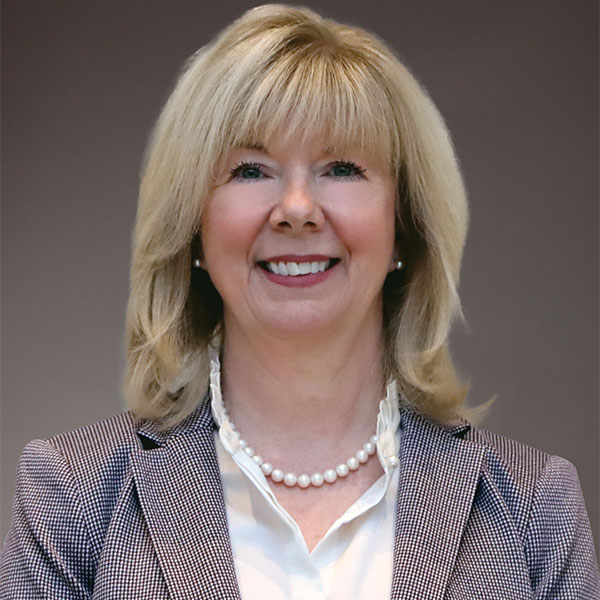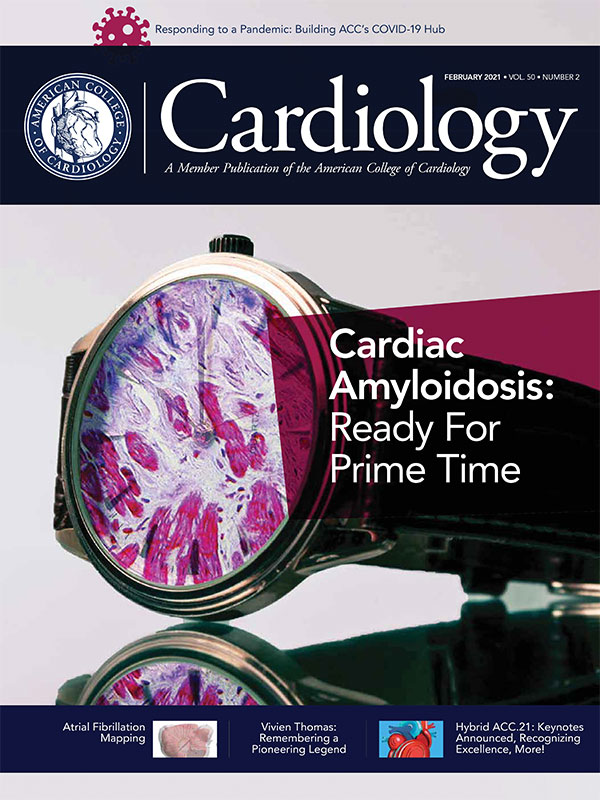Feature | Meet ACC CEO: Cathleen C. Gates

Stepping into her new role as ACC CEO, Cathleen C. Gates brings a unique leadership perspective that leverages an impressive 30-year career at the College. Cardiology spoke with Gates about her path to CEO, her plans for leading the College in 2021 and beyond, and more.
What are your priorities for ACC in 2021?
To survive the current COVID-19 crisis and emerge stronger and thriving on the other side, the College must continue to be focused, disciplined and agile as we work toward our Mission of transforming cardiovascular care and improving heart health for all patients.
We must keep our focus on patients and serving as the preeminent cardiovascular medical society and professional home for cardiovascular clinicians around the world. In the year ahead, we will focus on the four Strategic Initiatives reaffirmed by the Board of Trustees in 2020 and tied to our Strategic Plan.
These include: 1) guideline/guidance optimization; 2) NCDR optimization; 3) digital transformation; and 4) accelerated international strategy.
Organizational stability is fundamental right now. The ACC's professional, passionate and committed staff have worked tirelessly on behalf of the College and its members to help deliver on our Vision of a world where innovation and knowledge optimize cardiovascular care and outcomes.
Increasing member-staff alignment is a priority for me as we work together to focus on high-value deliverables, generate new areas for partnerships and innovation, and help to foster a College- and profession-wide culture that values diversity, equity, inclusion, teamwork, collaboration, professionalism and excellence.
What is your vision for ACC as we look beyond the immediate priorities and more toward the horizon?
Our world is changing at such a rapid pace – and not just the world of health care. In order to better serve our members and their patients in the changing landscape, we must find ways to be more agile.
This includes providing early clinical guidance surrounding ongoing scientific discoveries and therapeutics as well as the delivery of health care and finding innovative new ways to deliver education and the latest guidelines and research to clinicians around the world.
Importantly, we need to be proactive in meeting the needs of our members so they can provide the best care for every patient based on the latest evidence. We also need to be a strong advocate for solutions and policies aimed at reducing administrative burden, promoting practice stability, ensuring patient access to affordable care, and more.
Giving clinicians the tools and space to do what they do best – help and heal – must be prioritized.
What is the ACC doing really well? Where do we have opportunities to grow?
At the very onset of the COVID-19 crisis, we began providing ACC members with timely, relevant clinical guidance, expert commentary, frontline perspectives and patient resources via our COVID-19 Hub.
Our ability to quickly pivot to provide critical resources to members and patients at a time of great need underscores the importance of focus, discipline and agility in navigating through a crisis and can and should serve as a model going forward. We have evolved – and continue to evolve – in a very important way here and are better as a College and a profession for it.
I am also proud of what has been accomplished in our efforts to improve diversity, equity and inclusion within the cardiovascular workforce and the College. Some of our more recent activities include the creation of implicit bias training, the development of anti-racism resources and the launch of focused programs aimed at encouraging women and underrepresented minorities to seek careers and grow in leadership competencies in all aspects of cardiology.
We also continue to work closely with our partner cardiovascular societies and the broader House of Medicine to speak up and advocate for policies and programs that recognize health equity as a fundamental right.
Transforming cardiovascular care and improving heart health is deeply dependent on working for and alongside individuals with a diversity of backgrounds, experiences, ideas and perspectives, and while we still have a long way to go, it has been inspiring to see the changes that have been sparked to date.
Additionally, clinician well-being is another area where we've made headway over the last several years, but there is still much to be done, especially given the added challenges posed by the COVID-19 pandemic.
The burnout rate among clinicians is much too high and the stress and uncertainty of the past year have only added to very real mental health and well-being concerns. The ACC must continue work to provide resources that not only help our members on an individual level, but also clearly articulate the value of a healthy workforce to leaders within hospitals and health systems.
What are some of the most important things you have learned from your 30 years in various roles on staff at the College?
Relationships are critical. No one person can do it all. Building connections and combining the skills of those around you creates synergies that drive success. No matter what level you have achieved, there is always more to learn. This learning can come from people of all walks of life, if you're careful to listen.
Who or what has shaped who you are as a person and what you bring to the table as ACC CEO?
I've been fortunate to have a number of mentors along the way – people who perhaps recognized my potential before I saw it in myself.
Penny Mills, a former ACC vice president pushed me early on to step up and expand my role. She was the key staff lead for the Task Force for the 21st Century and brought me in as a critical contributor.
I learned a tremendous amount working alongside both Penny and Task Force Chair and Past President Michael Wolk, MD, MACC. Decades later, former ACC CEO Shal Jacobovitz encouraged me to apply for the CEO role.
In a handwritten note he left for me when he moved on to a new role outside of the organization, he told me that not only was I ready for the challenge, but that I possessed both the intelligence and EQ to take the organization to the next level.
Those were really powerful and inspiring words. I now find one of my greatest pleasures is mentoring the next generation and encouraging staff to grow themselves in ways they never thought possible.
Why are you passionate about the work the ACC does and the College's Mission?
I have always had a passion for health and wellness, and even received my undergraduate degree in dietetics! While I did not pursue becoming a dietitian after graduation, choosing instead to go into finance, I was always drawn to the science behind diet and exercise and their impact on overall health, including cardiovascular health.
In my three decades at the ACC, it has been exciting to witness firsthand the work cardiovascular clinicians are doing every day to prevent and treat heart disease. It is truly a privilege to be a part of this inspiring and lifesaving work.
You've mentioned you love to cook. Is there a favorite family recipe you make and is there a story behind it?
I'd have to say it would likely be a version of my Italian grandfather's feast of the seven fishes on Christmas Eve. Some of my favorite holiday memories are enjoying my grandfather's feast, followed by pizzelles. I now make a similar feast for my family each year. It's mostly a fish stew, but I serve starters of mini crab cakes and smoked salmon. Anything to get seven different kinds of fish on the table! We always follow the meal with anise flavored pizzelles, just like my grandfather, and then my parents, made every year.
Keywords: ACC Publications, Cardiology Magazine
< Back to Listings


